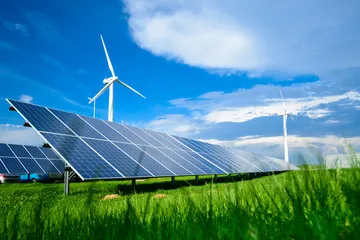+90 224 504 28 12 (TR)
Üçevler Mahallesi İzmir Yolu Cadde No:241/C Blok Westpoint D:32 Nilüfer, Bursa, 16120

Renewable Energy Creates New EMPLOYMENT Opportunities
The pandemic has changed the priority of government policies and budgets, the investment decisions of developers, and the world. In addition to this, increasing environmental pollution, climate change, rapid depletion of fossil fuel resources due to the non-recyclable use of raw materials and energy resources, and irreparable damage to natural life and the environment as they run out, and the increase in fuel prices have led the whole world to find a new energy source. With the emergence of future concerns, new technologies, ideas have been developed and the use of renewable energy resources (solar, wind, geothermal, hydroelectric (hydraulic), biomass and other (wave, tides, etc.)) resources has become necessary. Studies on renewable energy will lead to the rapid proliferation of renewable energy systems required for sustainable energy, the development of new technologies as well as economic growth, and the creation of new jobs with a future in the next decade (Moreno and Lopez, 2008: 733; Paska et al., 2009: 154; Dalton and Lewis, 2011: 2124). All these developments, while renewable energy investments create 450,000 jobs in the USA and 20,000 jobs in Denmark; In countries with a low population, such as Norway, there are companies that reach a huge size of 9 billion € in the stock market (Lund, 2009: 54).
With all this data, in addition to its contribution to the economy by developing renewable energy alternatives, increasing energy efficiency and thus reducing the effects of energy consumption on climate change, increasing energy supply security, its positive effect on employment has also been the subject of study in recent years. Environment, energy efficiency and renewable energy investments create thousands of job opportunities all over the world. Environmental awareness, Kyoto protocol, carbon tax, renewable energy investments and energy security, international agreements and cooperation in energy trade; It provides the emergence of new employment areas defined as “green jobs”. Renewable energy consultancy, renewable energy engineering, wind energy expertise, wind energy technician, carbon sales expertise, environmental and energy law expertise, organic agricultural engineering, ecological tourism consultancy, thermal insulation expertise, environmental engineering, ecological building design, wastewater expertise. “collar workers” are seen as professions that attract attention and will be demanded in the future. The occupational group we call renewable energy consultancy may become an important occupational group for such companies, both in terms of marketing and using new energy resources, with the acceleration of renewable energy investments in the recent period.
Renewable energy engineers try to reduce the damage to nature while reducing costs by finding environmentally friendly and economical methods of obtaining energy. In the wind energy specialty, as it is known, wind is one of the most known and most popular renewable energy sources. Currently, many companies have started to make wind turbines. For this reason, this situation also increases the need for wind energy specialists. Green marketing consultancy is the professional group responsible for carrying out tasks such as ensuring that the product is environment and nature friendly from production to consumption and contributes to nature. Green human resources management is the group that will prevent unnecessary resource consumption, implement common vehicles, participate in projects related to the environment, organize the office and the environment in a way that is suitable for nature and does not harm nature. Environmental and energy law expertise will solve the legal issues between the public and private sectors, and will ensure that companies work in accordance with these laws within the framework of EU harmonization laws in the coming years. Organic agriculture engineer is a professional group that performs agriculture based on natural, non-synthetic, input usage. It is an ecological production management system that supports and improves biological cycles and soil biological activity. They strongly follow principles in food production using reusable or recyclable materials, microorganisms and plants and animals to enhance soil flora and fauna. The main purpose of following organic practices is to protect and increase soil fertility with minimum environmental pollution. Ecological tourism/holiday expertise will need self-taught guides/experts and facilities specializing in nature and ecological tourism in the coming years. Places with natural hot springs, plateaus, ecological holiday villages, holiday farms will make holiday destinations a center of attraction by finding the deficiencies and producing solutions in line with the needs of middle-aged and older holidaymakers and people who want a healthy holiday.
Based on these researches, with the DESUWOW project, which we designed by considering the present and the future, we are carrying out this project, which focuses on the future by entering the developing energy sector in the world, both environmental protection, by talking and discussing current issues, and by targeting occupational groups that have been formed or will form in the future.
REFERENCES